- Home
- Medical news & Guidelines
- Anesthesiology
- Cardiology and CTVS
- Critical Care
- Dentistry
- Dermatology
- Diabetes and Endocrinology
- ENT
- Gastroenterology
- Medicine
- Nephrology
- Neurology
- Obstretics-Gynaecology
- Oncology
- Ophthalmology
- Orthopaedics
- Pediatrics-Neonatology
- Psychiatry
- Pulmonology
- Radiology
- Surgery
- Urology
- Laboratory Medicine
- Diet
- Nursing
- Paramedical
- Physiotherapy
- Health news
- Fact Check
- Bone Health Fact Check
- Brain Health Fact Check
- Cancer Related Fact Check
- Child Care Fact Check
- Dental and oral health fact check
- Diabetes and metabolic health fact check
- Diet and Nutrition Fact Check
- Eye and ENT Care Fact Check
- Fitness fact check
- Gut health fact check
- Heart health fact check
- Kidney health fact check
- Medical education fact check
- Men's health fact check
- Respiratory fact check
- Skin and hair care fact check
- Vaccine and Immunization fact check
- Women's health fact check
- AYUSH
- State News
- Andaman and Nicobar Islands
- Andhra Pradesh
- Arunachal Pradesh
- Assam
- Bihar
- Chandigarh
- Chattisgarh
- Dadra and Nagar Haveli
- Daman and Diu
- Delhi
- Goa
- Gujarat
- Haryana
- Himachal Pradesh
- Jammu & Kashmir
- Jharkhand
- Karnataka
- Kerala
- Ladakh
- Lakshadweep
- Madhya Pradesh
- Maharashtra
- Manipur
- Meghalaya
- Mizoram
- Nagaland
- Odisha
- Puducherry
- Punjab
- Rajasthan
- Sikkim
- Tamil Nadu
- Telangana
- Tripura
- Uttar Pradesh
- Uttrakhand
- West Bengal
- Medical Education
- Industry
Youth depression tied to higher risk of multiple diseases and premature death: JAMA

Researchers at Karolinska Institutet in Sweden have found in a large observational study that depressed children and teenagers have an increased risk of suffering from premature death and a wide range of illnesses later in life.
The findings highlight the need to look for other potential diseases following childhood or adolescent depression. Other psychiatric conditions, such as anxiety and substance misuse, can explain part of the association. The study is published in the journal JAMA Psychiatry.
"Our study shows that children and teenagers diagnosed with depression have a significantly higher risk of premature death, self-harm, and suffering from other diseases later in life" says Sarah E. Bergen, senior researcher at the Department of Medical Epidemiology and Biostatistics, Karolinska Institutet, and corresponding author of the study. "It underscores how important it is that these children and teenagers receive the help they need and that medical personnel monitor for subsequent psychiatric and somatic diseases."
Depression is rarely diagnosed in young children but increases in prevalence through the teenage years. Previous studies have linked depression in adolescents to an increased risk of several adverse outcomes, including atherosclerosis, cardiovascular disease and premature death. Other psychiatric conditions, such as anxiety and substance use disorder, are also commonly linked.
In this study, the researchers wanted to examine whether depression at an early age might be associated with a wide spectrum of diseases diagnosed later in life. They also examined how other psychiatric conditions affected the association and whether youth depression heightened the risk of premature death.
The researchers followed almost 1.5 million Swedish girls and boys, of whom more than 37,000 were diagnosed with depression at least once between the ages of 5 and 19. When the research concluded, they were between 17 and 31 years old.
The study found that children and teenagers with depression had a higher risk of being diagnosed with 66 out of 69 examined medical conditions, including sleep disorders, type 2 diabetes, viral hepatitis, and kidney and liver diseases. Compared to those without depression, they also had a significantly higher risk of injuries, especially injuries inflicted by self-harm, and an almost six-fold higher risk of premature death.
The findings also revealed sex differences. For example, women with early onset depression were more likely to suffer injuries as well as urinary, respiratory and gastrointestinal infections. Men, on the other hand, were more likely to have obesity, thyroid gland problems, coeliac disease, connective tissue disorders and eczema.
Part of the association may be explained by other co-existing psychiatric conditions, especially substance use disorder and anxiety, which have previously been linked to risk increases for certain medical outcomes. These psychiatric conditions often appear in the same patient and therefore more studies are needed to examine the specific effect of each condition, according to the researchers.
"We need more research to understand the causality between depression and other diseases," says Marica Leone, PhD candidate at the Department of Medical Epidemiology and Biostatistics at Karolinska Institutet, and first author of the study. "Currently, we cannot say whether depression leads to an increased risk of negative health effects or whether there are other underlying factors that lead to increased risks for both depression and the diseases examined in this study. Therefore, it is important to investigate how these processes affect each other and whether we, through discovery of these disease mechanisms, can find targets for intervention and treatment to improve overall health.
https://jamanetwork.com/journals/jamapsychiatry/article-abstract/2773999
Hina Zahid Joined Medical Dialogue in 2017 with a passion to work as a Reporter. She coordinates with various national and international journals and association and covers all the stories related to Medical guidelines, Medical Journals, rare medical surgeries as well as all the updates in the medical field. Email: editorial@medicaldialogues.in. Contact no. 011-43720751
Dr Kamal Kant Kohli-MBBS, DTCD- a chest specialist with more than 30 years of practice and a flair for writing clinical articles, Dr Kamal Kant Kohli joined Medical Dialogues as a Chief Editor of Medical News. Besides writing articles, as an editor, he proofreads and verifies all the medical content published on Medical Dialogues including those coming from journals, studies,medical conferences,guidelines etc. Email: drkohli@medicaldialogues.in. Contact no. 011-43720751


